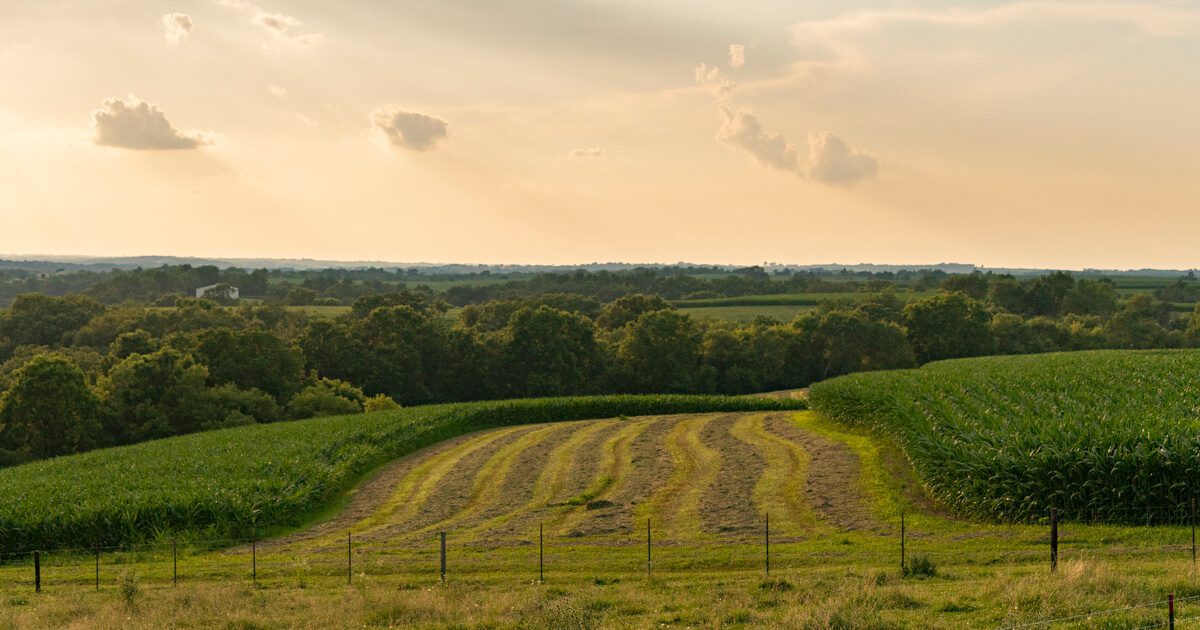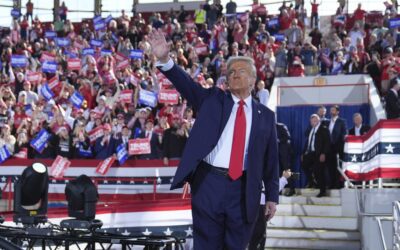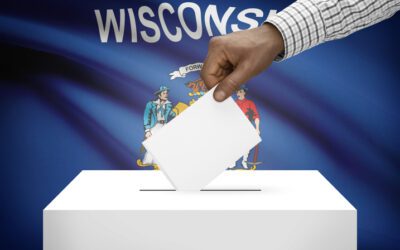
Wisconsin farm (Photo © Andy Manis)
Longtime writer of stories about Wisconsin agriculture and rural life sees Vice President Kamala Harris and her policies for farms and families as a better alternative than another round of Trump tariffs.
It’s still challenging for me to tell the difference between the dried corn leaves rattling and the chattering blackbirds flocking onto the cornstalks as I walk along the edge of a neighbor’s field on an October day – this despite my solid Wisconsin dairy farm upbringing in Clark County.
At the same time, after more than 45 years as an agriculture journalist and a stint as the executive director of the Wisconsin Farmers’ Union from 2009-2012, I clearly hear the choice in the upcoming Presidential election. In order to ensure that Wisconsin’s agriculture sector and rural economy thrive, we need a Harris-Walz victory.
I realize my taking such a position might surprise some in Wisconsin ag circles. Most know I generally hold my political cards close to my chest, but I’m compelled to voice my choice in this election cycle. There are sharp contrasts between the choices at hand and it’s critical that we all make informed decisions come November.
Agricultural trade is one of the most obvious differences between the tickets. Former President Trump continues to say he’s going to place huge tariffs on imports, especially from China. For Trump, tariffs are a blunt instrument to beat trade partners into submission in efforts to improve the U.S. trade balance. But the Trump Administration tried this before by slapping tariffs on China in 2017/2018. The effect was Trump’s blunt instrument bludgeoning American farmers. Trump’s trade war with China led to retaliation, which meant China closed its market to U.S. agriculture and sourced commodities from other countries. According to the USDA, U.S. farmers suffered $26 billion in lost agriculture trade revenue, with U.S. soybeans taking the hardest hit. The federal government had to make emergency payments to cover farmers’ losses, and we have never fully recovered.
The Harris-Walz ticket will continue the Biden-Administration’s understanding about how more common-sense surgical tariffs are required so our agricultural exports are safe and even increased. American Farm Bureau statistics remind us that farm bankruptcies reached record highs during the Trump Administration and then declined during the Biden Administration. There is no desire in the Wisconsin countryside to repeat ag trade policies that help to again increase farm bankruptcies.
Immigration policies also draw important contrasts. Former President Trump and his running mate say they will have mass deportations of immigrants, no matter whether they’re here legally or illegally. That would crush the country’s agricultural workforce, as more than 80 percent of the nation’s agricultural workers are foreign-born – and they’re doing work that otherwise wouldn’t get done, as those jobs otherwise wouldn’t be filled. Plenty of dairy farms in our region are employing immigrant labor; a 2023 University of Wisconsin School for Workers survey shows more than 10,000 undocumented immigrant workers perform about 70 percent of the labor on Wisconsin dairy farms. The Harris-Walz ticket recognizes that and will work to deal with illegal immigration while finding ways for the legal immigrant labor force to remain stable and intact.
Access to affordable health insurance also is important to rural Wisconsin folks, and that’s another area of great contrast. Former President Trump has long supported fully eliminating the Affordable Care Act, even though it’s become a go-to health insurance option for so many rural people. The Affordable Care Act (aka Obamacare) reduced the number of uninsured U.S. rural residents from 19 percent in 2008 to 13 percent in 2019. The Harris-Walz ticket will continue to strengthen the Affordable Care Act. And, as part of the Biden Administration, Vice President Harris worked to increase funding of rural hospitals – with $130 million provided to train more rural nurses and physicians, and expand telehealth options. She also has been part of keeping prescription drug costs in check, such as capping insulin costs for the 10 percent of rural residents diagnosed with diabetes, and helped limit out-of-pocket prescription drug prices to $2,000. Ensuring access to affordable health care and keeping rural communities healthy remain a top priority of the Harris-Walz team, just as it is to rural Wisconsin.
Comparisons can’t leave out the fact that, in his administration’s last budget proposal, former President Trump proposed cutting crop insurance, limiting farm payment eligibility and cutting conservation programs. The Project 2025 playbook formed by people close to the former President also calls for the elimination of critical ag safety nets such as Agriculture Risk Coverage and Price Loss Coverage, and ending the Conservation Reserve Program.
Separating the sounds of cackling blackbirds and dried cornstalk leaves rattling in a Wisconsin cornfield might be difficult. But this Autumn brings clear differences between Presidential candidates. The Harris-Walz ticket will support farmers and all rural Wisconsinites far more than the Trump-Vance ticket. And, it doesn’t hurt that Vice Presidential candidate Tim Walz – governor of our neighbors to the west – has known what it’s like to dirty his fingernails in our Midwestern soil.

Harris says nation must accept election results while urging supporters to keep fighting
Harris delivered her remarks at Howard University, her alma mater and one of the country's most prominent historically Black schools, in the same...

SHIFT-RIGHT, BACKSPACE
Wisconsin is the state that puts Trump in the White House—again. Sen. Tammy Baldwin hangs on for a narrow win. Unrigged maps have given the...

Presidential race too close to call as vote counts continue in key swing states
Results in Michigan, Pennsylvania, and Wisconsin may not come in until Wednesday morning, and Arizona and Nevada are unlikely to see calls made...

Some Milwaukee absentees to be retabulated out of ‘abundance of caution,’ after consulting with GOP & Dem officials
About 31,000 absentee ballots will be run through tabulating machines again after doors were found not properly closed. Approximately one-third of...





